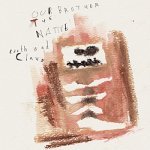
Our Brother the Native Tooth & Claw
(Fat Cat)
Animal Kindergarten? The Gamma Band? Godspeed You! Black Dauphin? The puns and comparisons stack up with this precocious little gang. Our Brother the Native are three American teenagers, John Michael Foss and Josh Bertram, from Michigan, and percussionist Chaz Knapp, from California. A few years ago I reviewed an album and commented that its sound gave the impression that the members of the band had been working in separate, soundproofed rooms. With OBTN, something even more remarkable is true: John and Josh have been recording together since school, but the two had never even met the third member of the band until a recent showcase gig in Belgium earlier this year. Previously, material had been exchanged over the internet and the band's ethos and direction had been worked out in lengthy cross-continental telephone conversations. Josh and John recorded their acoustic and electric guitars straight to computer, with Chaz then adding a further layer, before the boys added another, the result being the layers and loops of guitars, sound effects, birdsong, erm, their mum making funny noises in the background, and the occasional banjo.
Admittedly, the initial results are underwhelming - perhaps one should always skip a track that uses a variant of Introduction in its title (apart, of course, from Suede's heart-stopping Introducing the Band) - with a reedy, infantile sound dominating. Yet as one picks through the strange track titles, each reminiscent of something Eric Satie might have conjured up after a heavy night on absinthe - Apodiformes, Falconiformes, inter alia - a distinctive and rather attractive musical sound emerges. Like Headphone - the band whose work I considered had been recorded by individuals who had never met - OBTN are both organic and thoroughly modern. Much of the album is chaotic, with tracks changing tempo, melody and tone without notice, and snatched conversations and vocals suggesting a vague sense of loss. Yet it's an innocent, naïve, and utterly unpretentious sound, fit for the joys of spring. Toward the end of the album, their wholesome folkiness begins to win out, with simple female vocals, banjos and other plucked strings dominating.
Our Brother the Native are a wide-eyed, idealistic bunch, if this album may be taken as evidence, a sort of musical Freeganism, perhaps. Yet, cutting through the misdirected, occasionally incoherent moments of this album, this is music than can open up one's eyes to the childish pleasures of sound. Isn't that what music's meant to do?
12 August, 2006 - 22:00 — Ben Bollig